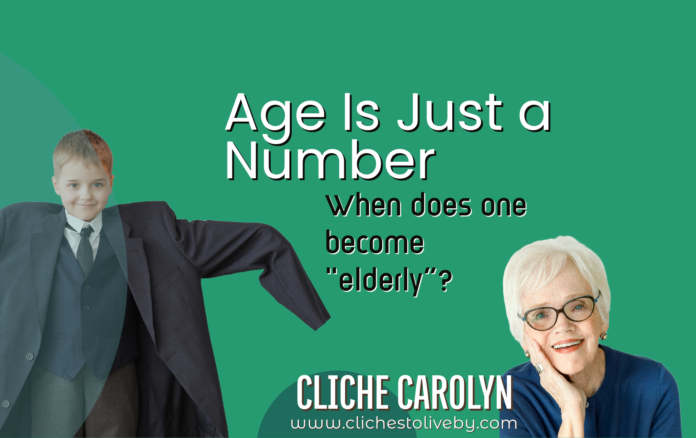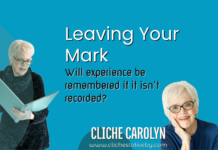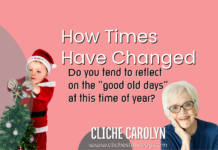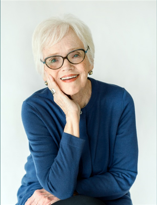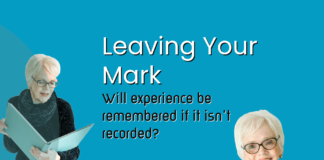Dr. Carolyn Lee reflects on a different cliché each week. Recently, in her blog “You Are What You Eat,” she looks at the ways in which our eating habits and attitudes toward food say something about our personalities. This week Carolyn explores the cliché, age is just a number.
Learn more about Dr. Carolyn Lee on her biography page or investigate 29 more clichés in her latest book, Keep Your Eye on the Ball And Other Clichès to Live By.
Age Is Just a Number
Well, I suppose that’s true, but, when the number is eighty-four, certain realities must be faced. I am just now getting to the point where I must acknowledge that, by almost anyone’s standards, I am not just “mature;” I am not just “middle-aged;” I am . . . elderly. Elderly?! How did that happen? It seems like I was nineteen for quite a while. Then, suddenly, I was twenty-three. I was teaching at Theodore Roosevelt High School in St. Louis, and twice I was asked to leave the teachers’ lounge because my colleagues thought I was a student. I was just a few years older than the kids in my class and the youngest person on the faculty.
The next birthday I remember is my thirtieth. I had just started graduate school at the University of Michigan. I ate my birthday dinner sitting on a stool in a greasy-spoon diner in Ann Arbor, Michigan. After my celebratory bowl of chili, I returned to my room in the graduate dormitory and watched Birdman of Alcatraz on my little black-and-white television. It was not a particularly happy occasion, but I don’t remember experiencing any significant angst about leaving my twenties.
I was teaching at the University of Texas when I turned forty. On the morning of my birthday, I went to my office, and, when I opened the door, I saw dozens of balloons and a sign that said, “Carolyn Bites the Big One.” I thought that was very funny—and maybe symbolic. It wasn’t until my fiftieth that it became clear to me that youth was part of my past. I was teaching at TCU, and I was not the youngest person on the faculty. I was now more than twice the age of my students. But, oh well. You’re as young as you feel, right? When I turned sixty, I celebrated the occasion by putting on “Carolyn’s Cabaret,” an occasion that allowed me to indulge myself in front of a forgiving audience and have the time of my life.
Then there was seventy. Hmmm . . . this was getting serious. When I went for my annual physical that year, my doctor asked me a series of questions: “Can you still feed yourself?;” “What day of the week is this?;” “How many times have you fallen since our last visit?” Still, I could find all this sort of amusing; my doctor and I laughed together.
But eighty was a different story, and it wasn’t all that amusing. I found it almost impossible to believe that I had reached that particular marker. I remembered when my mother turned eighty. We threw her a fun and festive party, and she loved every minute of it, but I had to acknowledge that my mother was officially old. Now I was officially old, and I was a little self-conscious about it. Every time I picked up a prescription at the pharmacy, I was asked my date of birth. When I had to say, out loud, “1939,” I was sure the pharmacist looked surprised that I was still on my feet.
Well, I am on my feet. And I’m reasonably healthy; I am financially stable; I love my family; I have a lot of good friends, and the future, although shorter than it used to be, looks pretty good. Let me just mention a few of the positive things about being eighty-four—in no particular order:
- There are fewer pressures and responsibilities at this age, more down-time and freedom. This leads to a level of contentment I never reached in my youth.
- NOT working opens up all sorts of possibilities—opportunities to travel, being able to read all afternoon, visiting with friends, cooking and entertaining, writing a book and maybe even a series of blogs!
- Being/staying at home offers satisfaction that was heretofore unnoticed.
- The experience and wisdom acquired through the passing of years is occasionally recognized. In some circles, one can almost achieve guru status.
- Life-long friendship takes on new meaning when life is long.
- There is no longer the necessity of remembering what day of the week it is, because it doesn’t make much difference.
- Having lived a long time means having more stories to share. Stories can become a way of making our experience accessible to others.
- Acceptance is freeing—not resignation, mind you, but acceptance.
- Age brings the ability to recognize that a certain amount of pain is part of the deal and being a good sport about it is a requirement.
- A highly-developed sense of gratitude and appreciation for the little—and precious—things of life.
When you’re eighty-four, waking up every morning is kind of a nice surprise. You realize every day that a lot of people don’t get to be eighty-four; you’re one of the lucky ones. I woke up this morning and thought, “Ah! Lucky me! A beautiful, sunny Tuesday!” But then, “Wait a minute; this isn’t Tuesday; it’s Wednesday.” And then, “Oh, who cares?”
Want to Read More?
Check out Dr. Carolyn Lee’s blogs on her website, she features a new cliché each week or you can order her new book, Keep Your Eye on the Ball And Other Clichès to Live By. Want to know more about the woman behind the words? Read more about Carolyn here. We hope you enjoyed this article learning more about the cliché, age is just a number.
